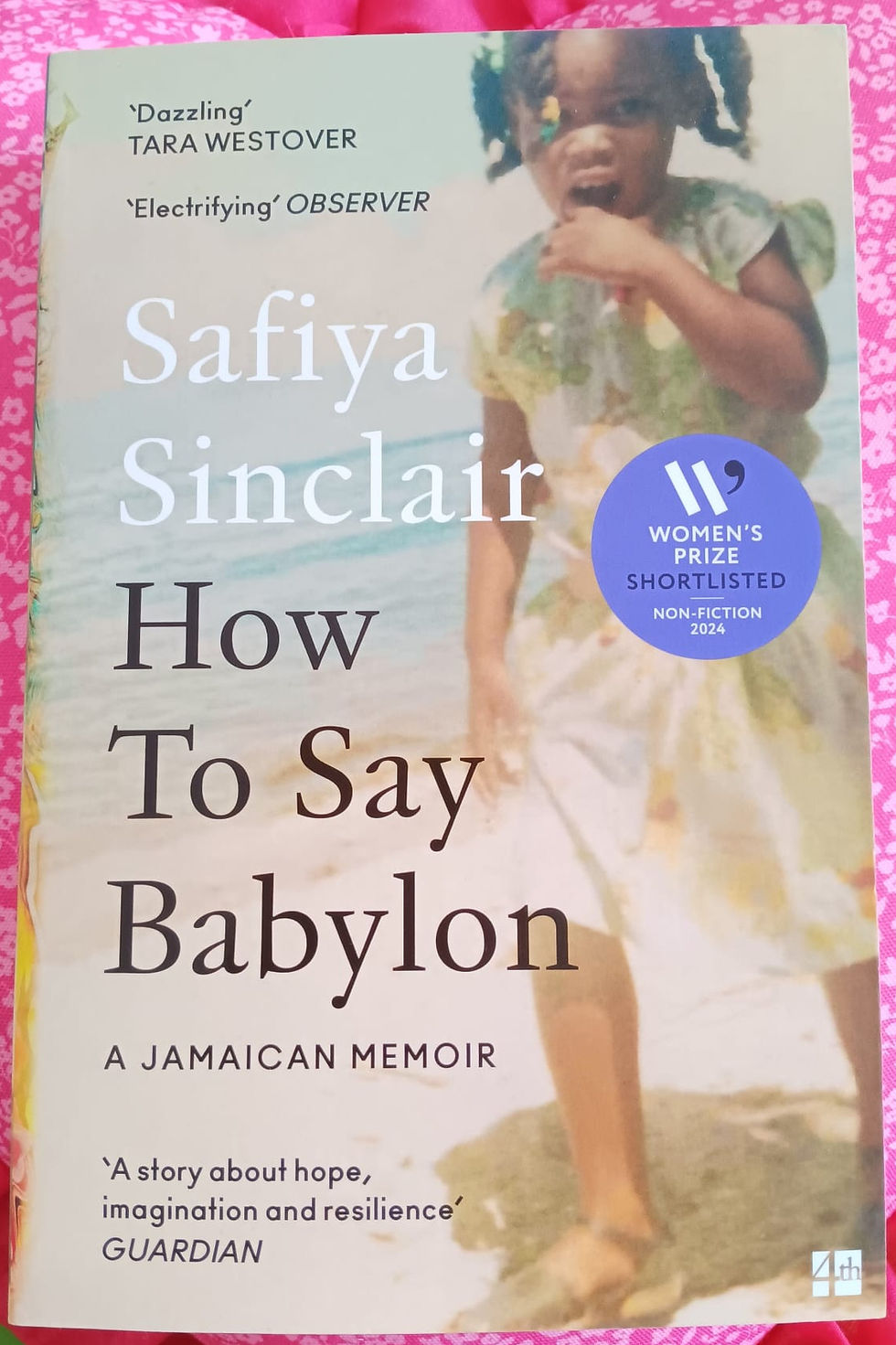BOOK REVIEW: YELLOWFACE by REBECCA F. KUANG.
- booksandjoyfulness
- Nov 11, 2024
- 7 min read
Updated: Nov 22, 2024
“And I wanted to ask you, why do you think it’s okay for a white author – I mean, an author who isn’t Chinese – to write, and profit from, this kind of story? Why do you think you’re the right person to tell it?” [1]

A few days ago, I gave Yellowface by Rebecca F. Kuang a second reading where I either read or skim read paragraphs and chapters.
I usually do this with all my book reviews, as I like to re-read books to refresh my memory or to pick up further themes and meanings. Whilst reading Yellowface again, I smiled and laughed at my annotations and fierce commentary. Great art is supposed to move you and Yellowface moved me. Great art should also lead to discussions and ideas for positive change that last long into the future.
Yellowface is a daring, dynamite exploration into themes and commentary on: cultural appropriation; racism; exploitation; intellectual property theft; mental health; cultural bias and its influence on how we write and interpret literary texts and the publishing industry. Rebecca F. Kuang writes with masterful understanding of the psyche of her characters. Scenes are vivid and turns of phrase are clear, precise and piercing.
The quote referenced at the beginning is, in my view, the central question of the novel, particularly because the main antagonist June Hayward/Juniper Song steals her ‘friend’ Athena Liu’s manuscript for her novel after Athena’s untimely and tragic death; adds her own writings and modifies the novel and passes it off as her own work. This is a complex novel, with an abundance of nuance.
Some may ask what the line is between modifying and/or contributing to a piece of work and committing plagiarism? Indeed, June herself asks “Does the way it’s credited matter as much as the fact that, without me, the book might never see the light of day?” [2] I’d say the line is crossed when someone doesn’t credit all writers involved and presents a piece of work and the ideas in it as being created entirely by them.
I will mostly focus on reviewing Rebecca F. Kuang’s characterisation of June Hayward/Juniper Song, showcasing the layered racism of both this character and the publishing industry. Come, let’s peel back the layers together from the thin outer skin and film to the thicker malodorous layers inside, right until we get to the apex. Try not to cry. See what I did there? Ha!
Rebecca F. Kuang invites us to examine, analyse and pare the many coatings of racism in this novel.
1. June Hayward, a white woman, steals an Asian person’s work and then passes this work off as her own. June also capitalises from Athena’s death.
We know that June steals Athena’s work, taking Athena’s manuscript home with her the night Athena dies (page 21). June proceeds to spend almost the entire novel determined to lie, manipulate and hide the fact that she stole Athena’s work. June says that her grief over Athena’s death becomes a “cornerstone of [her] origin story”. [3]
2. June Hayward is manipulative at multiple points in the novel.
To hide her wrong-doing and smother any dissenting voices regarding the credibility of ‘her’ work, June uses scarily sophisticated manipulation techniques to get an editorial assistant who expresses a need for a sensitivity reader (p. 63, 64, 65, 66,) taken off working on her book; psychologically breaks down (p.245, 246, 247 and 248) a student at a summer writing programme who had drawn attention to discussions surrounding the book she plagiarised (p. 244) and tricks Athena’s ex-boyfriend into admitting on record to blackmailing her for some of the book profits in exchange for keeping quiet about her stealing Athena’s book (p.184,185,186.) June even creates a scholarship honouring Athena at a workshop for people who are Asian American as a way of helping to hide her theft (p. 48.) June is so confident in her deceit that she declares “I’m skilled with words. I know how lie without lying.” [4]
3. June Hayward makes patronising comments about people’s English/ English fluency/ use of the English language and repeatedly makes negative comments about Chinese food.
She is routinely surprised that Asian characters in the novel can speak standard English (p. 51 and 231.) June is surprised that Athena’s Mother, Mrs Liu and a restaurant worker in Chinatown can speak good English , June disparages the odour of the car that the Events Coordinator of the Chinese American Social Club picks her up in and has a very negative attitude towards Chinese food (p.119 and 26.)
4. June Hayward and her publishing company position her as being racially ambiguous.
The publishing company “want to position [June] as worldly” [5] and regarding her official author photos, June herself notes that “During golden hour, I come off as nicely tanned, which makes me look sort of racially ambiguous”[6] and her name used to market the book is ‘Juniper Song’, an arguably racially ambiguous name. June herself notes that “No one says explicitly that “Song” might be mistaken for a Chinese name” [7]
5. Many parts of Anthea Liu’s work are changed, and the voice and experiences of Chinese characters are flattened.
The cultural erasure is truly disturbing. In the process of changing Athena’s work to pass it off as her own, June strikes out half of the Chinese characters (letters) Athena had left spaces for in her writing (p.42.) June and her editor violently hack through Athena’s work in a frenzy of cultural dismissiveness. June says that she’s “read dozens of guides to the Chinese kinship nomenclature system by now. It makes no goddamn sense[,]” [8] and says, “We change almost a dozen names to reduce confusion.” [9]
Pages 42-45 showcase the violent microaggression of cutting through someone’s work, changing the narrative and being extremely dismissive of their culture and the story they are trying to tell. It is important to draw attention to the changed narrative as June says “Instead we switch one of the white bullies to a Chinese character, and one of the more vocal Chinese laborers to a sympathetic white farmer.” [10] June then decides that “[t]his adds the complexity, the humanistic nuance that perhaps Athena was too close to the project to see.” [11]
We interpret texts based on our Cognitive Bias. Psychologist Kia-Rai Prewitt PhD explains in the article ‘Cognitive Bias 101: What It Is And How To Overcome It’, “If we have a cognitive bias, we may interpret information based off of our own beliefs and experiences[.]”[12] June seems to suggest that Athena’s bias has clouded her judgment with regards to her work which may be true, however June herself has arguably made changes to Athena’s work from the point of her own bias. Athena mentions that people approach texts with preconceptions (p.37.) Who is to say that changing the narrative adds humanistic nature or complexity? Who is to say that June’s own cognitive bias has led her to change many aspects of Athena’s novel and change the narrative?
Of course, it is also important to understand the context of many novels and stories. We must understand the societies writers live in when they write. We should analyse and evaluate literary works within types of contexts such as Historical, Physical, Cultural and Situational contexts [13]. This can help us to understand a writer’s frame of mind and influences when writing and evaluate how their social and historical influences are evident in their writing. Athena’s original manuscript would only fully be exposited through understanding the contexts in which she was writing.
Question: What happens when a writer modifies another writer’s work without proper credit. Are contexts mixed together? Perhaps we may understand the manuscript that was published that was stolen and modified by June within the social context of a publishing industry that is presented to be defective and competitive and does not appear to allow for true diversity.
6. Exploitation and Intellectual Property theft.
June steals Athena’s Intellectual Property. Athena’s book about the Chinese Labour Corps is a creation of her own “human mind” [14] as explained in the BASIC NOTIONS OF COPYRIGHT AND RELATED RIGHTS prepared by the International Bureau of World Intellectual Property Organisation. June exploits Athena’s work for her own personal gain and commits copyright infringement. It is noted that June says she changed most of Athena’s work (p.36.) and describes the significant modifications made to Athena’s work on page 29 . The hacking of Athena’s work can also be seen from pages 42-45. However, the modifications and additions made are fundamentally based on Athena’s work. June does not credit Athena, in fact she ponders the importance of crediting compared to the work not being published without her (p.31.) Yes, June has made substantial changes - but this is Athena’s work, Athena’s manuscript and June has not credited her. June herself considers issues of ownership, crediting and how to discuss this with her literary agent (p 30.) It is important to note that “Infringement can be in relation to the whole or a substantial part of the work. A 'substantial' part of the work has been copied if the infringer has taken the "author's intellectual creation"”. [15]
It is possible Athena crafted a story for a literary magazine that is based on June’s experience of what certainly appears to be sexual assault. Whilst morally wrong if Athena did base her story on June’s horrific experience, I would argue Athena didn’t commit copyright infringement. “It is important to note that ideas are not protected by copyright; only the expression of those ideas as fixed in a material form are protected.” [16] Furthermore it may be difficult to prove that the story written was specifically about June’s experience.
Conclusion:
Through June’s characterisation, R.F. Kuang peels back and showcases the pungent, eye-watering, complex layered racism and irony of June Hayward ‘writing’ a novel about the Chinese Labour Corps [p.27] but not having much or any respect for the culture she has ‘written’ about. The layers are theft; manipulation and use of psychological violence; the structural force of the publishing company to silence detractors; capitalising from racial ambiguity and changing the narrative of Athena’s story.
Usually, I like to structure my reviews of fiction writing based on characterisation, literary techniques and structure. On this occasion, I really wanted to focus and home in on the complexity of how racism manifests itself through this character. Racism isn’t just shouting nasty words; it’s about using power which can come in the form of structural and psychological violence to subjugate and control. Through exploring the complex coatings of June’s racism in Yellowface, I believe Rebecca F. Kuang will usher in continued and necessary discussions about this important topic, so that the publishing industry and society as a whole can continue to dismantle harmful structures.
[1] Yellowface by Rebecca F. Kuang, Chapter 8, page 105.
[2]Ibid., page 31.
[3] Modified quote taken from Ibid. page 47.
[4] Quote taken from Ibid., page 221.
[5] Quote modified. Taken from Ibid. page 61.
[6] Ibid., page 70.
[7] Ibid., page 61.
[8] Ibid., page 42.
[9] Ibid., page 42.
[10] Ibid., page 43.
[11] Ibid., page 43.
[12] Words by Dr Kia-Rae Prewitt, Article entitled ‘Cognitive Bias 101: What It Is and How To Overcome It’ https://health.clevelandclinic.org/cognitive-bias
[13] Words and ideas taken from article entitled ‘Why Is Context Important In Writing? 4 Types of Context Explained https://www.masterclass.com/articles/why-is-context-important-in-writing




Comments